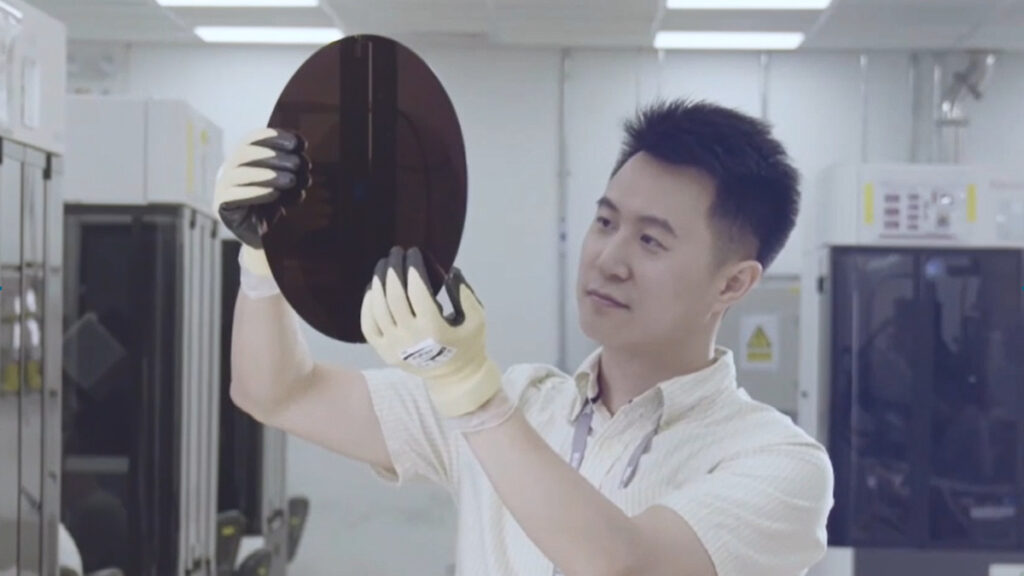The United States plans to impose a 100% tariff on all semiconductor imports, while exempting chipmakers that have already invested in or promised to build factories on its soil.
US President Donald Trump made the remarks in the Oval Office during a meeting with Apple Chief Executive Tim Cook on Wednesday (August 6). “But if you’re building [factories] in the US, there’s no charge,” Trump told Cook.
They were meeting to discuss an agreement for Apple to invest an additional $100 billion, on top of the $500 billion it pledged to invest in February, for making iPhone components in the US over the next four years.
South Korean officials told the media they will be exempt from Trump’s 100% tariff, as South Korean companies promised to build fabrication plants in the US.
Liu Chin-ching, minister in charge of the National Development Council in Taiwan, also said that Taiwan Semiconductor Manufacturing Co (TSMC), the world’s leading chip maker, is also exempt from the chip tariffs because it has plants in the US.
On Wednesday, TSMC’s Taipei-listed shares gained 4.9% to NT$1,180 (US$39.6) on the news of its exemption.
As the US expands its domestic chip-making production capacity, Taiwan’s global chip manufacturing market share is expected to decrease to 60% in 2027 from 68% in 2023, according to TrendForce, a Taiwan-based market intelligence and consulting firm.
TrendForce stated that the United States’ market share will grow from 12% to 17%, while South Korea’s will increase slightly from 12% to 13% over the same period. Japan’s market share is predicted to surge from 0% to 4%, while China’s will fall from 8% to 6%, according to the projection.
Immediate impact
Trump’s 100% tariff applies to all chip imports, but due to numerous exemptions, only Chinese chipmakers will be affected.
In an article published in April, before Trump’s 100% tariff announcement, a Hunan-based columnist predicted that the impact of US tariffs on Chinese chipmakers will be minimal. In 2024, Chinese direct exports of integrated circuits to the US totaled US$2.2 billion, or 1.4% of China’s total chip exports, according to official customs department data.
However, the writer failed to note that about $67.7 billion of Chinese integrated circuits were shipped to Hong Kong last year, accounting for 42.3% of China’s total chip exports. It is believed that many of these chips were re-exported to other countries, though a more detailed breakdown by product is not available.
The Census and Statistics Department’s research data showed that Hong Kong exported $6.8 billion of semiconductors and electronic valves and tubes to Vietnam, $6.5 billion of the same products to India and additional amounts to other Southeast Asian countries in 2023.
The Hong Kong Trade Development Council said the city’s exports to the US amounted to $34.9 billion in 2023, 7% of which were semiconductors and electronic valves and tubes ($2.4 billion).
It’s unclear whether the Trump administration will impose new tariffs on electronic products that use Chinese semiconductors. If not, Chinese chipmakers will still have to pay several billion dollars in tariffs to the US annually, unless they diversify to customers outside the US.
Chinese parts suppliers
On Thursday, TMTpost.com, a Beijing-based technology news outlet, published an article titled “Trump has gone crazy! The US will impose a 100% tariff on chip imports. The global supply chain is on high alert.”
“The new US tariff imposed on global chipmakers will significantly impact China’s supply chain,” says Lin Zhijia, the article’s author. “The uncertainty caused by US tariffs will discourage Apple from sourcing components from Chinese suppliers.”
Citing Bloomberg’s data, Lin says that about 24% of Apple’s suppliers are based in the US, followed by those in China (18.2%), Japan (13%), Taiwan (12.7%) and South Korea (8.3%).
While Apple will use fewer Chinese parts, it will continue to rely on its partner Foxconn to assemble most of its iPhones in China.
In fact, Tim Cook said Wednesday that “Made in US” iPhones won’t be seen for a while, as assembly will still be done “elsewhere.”
Evercore ISI, a research unit of the New York-based Evercore, said in a note in March that China accounts for about 80% of Apple’s production capacity. Around 90% of iPhones are assembled in China.
Estimates show that 55% of Apple’s Mac products and 80% of iPads are assembled in China.
In May, US Treasury Secretary Scott Bessent said the US would not pursue a generalized decoupling with China, but would push for a “strategic decoupling”, particularly in critical sectors such as medicine and semiconductors.
Trump told CNBC in an interview on Tuesday that the US will soon impose a 15% tariff on all pharmaceutical imports. He said after one to 1.5 years, this tariff will increase to 150% and then to 250%. He said he wants Swiss firms to produce medicines in the US, not in China. Trump recently imposed a new 39% tariff on Switzerland, one of the highest on any country in the world.
Read: China fears Nvidia chips could track, trace and shut down its AIs

